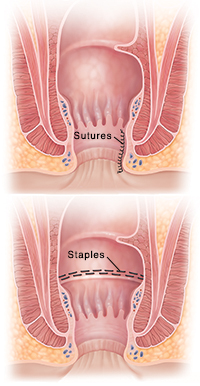Treating Hemorrhoids: Surgery

You may need surgery for hemorrhoids if they cause severe symptoms. You may also need surgery if your hemorrhoids come back after you've tried other treatments, such as rubber-band ligation or infrared coagulation. Your healthcare provider can tell you about the procedure that will be used. You’ll also be told how to get ready for the surgery and what to expect after it.
Getting ready for surgery
Your surgery will be done at a hospital or outpatient surgical center. Follow your healthcare provider’s advice on getting ready for surgery.
-
Tell your healthcare provider about all the medicines you take. This includes both prescription and over-the- counter medicines, vitamins, herbs, and other supplements. It also includes blood thinners, aspirin, and ibuprofen. In some cases, you may need to stop taking some or all of them before surgery.
-
Stop smoking.
-
Plan for an adult family member or friend to give you a ride home after the procedure.
-
Follow any directions you're given for not eating or drinking before your surgery.
-
Do a bowel preparation, such as an enema or laxative, if told to do so.
Risks and possible complications
The risks and complications for this surgery are:
The day of surgery
Be at the hospital or surgery center on time. You'll be asked to sign some forms and change into a gown. You’ll then be given an IV (intravenous) line in your hand or arm. This IV gives you fluids and medicine. You may also be given a laxative or enema to clean stool from your rectum. Just before surgery, you’ll talk with an anesthesiologist. They can tell you about the type of medicine used to prevent pain during surgery. You may have:
-
Local anesthesia that numbs just the surgical area
-
Monitored sedation that makes you relaxed and sleepy
-
Regional anesthesia that numbs certain parts of your body
-
General anesthesia that puts you to sleep during the procedure
During surgery
Your healthcare provider will put a scope into your anus to view the anal canal. They will use certain tools to take out the swollen hemorrhoids. Your cut (incision) will be closed with stitches (sutures) or staples.
Hemorrhoidectomy with stitches
The hemorrhoids are taken out using surgical tools, such as a scalpel or sealing (cautery) device. The cut is then closed with stitches. In some cases, the cut may be left partly open. This lets fluid drain and helps with healing.
Stapled hemorrhoidopexy
This procedure uses a special tool to take a ring of tissue from the anal canal. Removing the tissue cuts off blood flow to the hemorrhoids. so they will shrink. The tissue ring is then secured with staples. This helps hold the tissue in place.
After surgery
You’ll be taken to the PACU (post anesthesia care unit) to be closely watched. You can often go home the same day. But in some cases, you may need to stay in the hospital overnight. For a short time after surgery, you may have nausea, minor bleeding, and discharge. You’ll also likely have some pain. To help you feel better, your healthcare provider will give you pain medicine. You may also be given medicines to help make bowel movements easier.
When to call your healthcare provider
After surgery, call your healthcare provider right away if you have:
-
Increasing pain
-
Bleeding that doesn't quickly stop
-
Fever of 100.4°F (38°C) or higher, or as directed by your provider
-
Chills
-
Inability to move your bowels
-
Trouble peeing
Online Medical Reviewer:
Heather M Trevino BSN RNC
Online Medical Reviewer:
Robyn Zercher FNP
Online Medical Reviewer:
Ronald Karlin MD
Date Last Reviewed:
4/1/2024
© 2000-2025 The StayWell Company, LLC. All rights reserved. This information is not intended as a substitute for professional medical care. Always follow your healthcare professional's instructions.